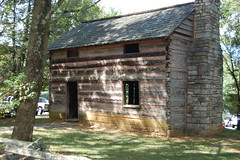 |
| Wheeling Custom House; Independence Hall, 1861 |
- US forces invading western Virginia skirmish at Frankfort and Patterson’s Creek with Confederate forces involved in retreating from Harper’s Ferry./1861
- From Washington, President Lincoln unconstitutionally and illegally recognizes the Wheeling government of Federal Virginia, the western Virginia counties which voted to secede from their state. Lincoln is now meddling in local and state affairs yet refuses to recognize (except by invasion) the States which have seceded from the Federal Union./1861

































